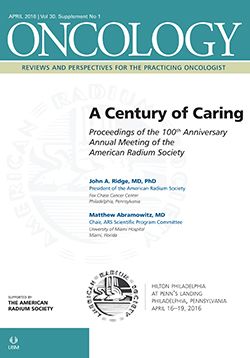(P044) Comparison of Toxicity-Related Breaks in Treatment Utilizing Intensity-Modulated Radiation Therapy (IMRT) vs Three-Dimensional (3D) Conformal Techniques in the Treatment of Anal Cancer
In our small cohorts, no significant difference was seen in toxicity-related treatment breaks between IMRT and three-dimensional conformal RT.
Eric Kemmerer, MD, Abhishek Mishra, Shreyas Ranganna, Roderick Price, Lydia Komarnicky, MD, Jaganmohan Poli, MD; Drexel University
PURPOSE: The definitive treatment of patients with anal cancer using radiation therapy (RT) and concurrent 5-fluoropyrimidine (5-FU) and mitomycin-C (MMC) is associated with acute toxicities during treatment, which may necessitate a break in RT. Radiation Therapy Oncology Group trial 0529 reported a significant decrease in grade ≥ 3 dermatologic and gastrointestinal acute toxicities with the use of dose-painted intensity-modulated RT (IMRT) vs three-dimensional conformal RT (3DCRT) techniques. Here, we investigate whether IMRT use may result in fewer toxicity-related treatment breaks in a cohort of patients treated at our institution.
MATERIALS AND METHODS: From 2005–2015, a total of 22 patients with T1–4N0–3M0 squamous cell carcinoma of the anal canal treated with IMRT (n = 12) or 3DCRT (n = 10) were identified. Median total dose to the primary tumor overall was 50.4 Gy, with a median dose of 45 Gy (range: 45–55.8 Gy) in the 3DCRT cohort and 50.4 Gy (range: 46.8–54 Gy) in the IMRT cohort. Median age was 51 years. Further, 79% of patients received 5-FU and MMC, two patients (9%) received 3DCRT with 5-FU only, and one patient (4.5%) received 3DCRT without chemotherapy. Patients who had a documented treatment break for grade ≥ 3 acute toxicity were identified, as was the corresponding elapsed day of treatment on which the first break occurred. Time to first treatment break was examined using Kaplan-Meier analysis and log-rank testing.
RESULTS: Overall, cumulatively, 16 patients (73%) required a treatment break, at a median of 18 days of elapsed treatment. Also, 92% and 50% of IMRT and 3DCRT patients required treatment breaks, respectively (log-rank test P = .141).
CONCLUSION: In our small cohorts, no significant difference was seen in toxicity-related treatment breaks between IMRT and 3DCRT.
Proceedings of the 98th Annual Meeting of the American Radium Society -americanradiumsociety.org

2 Commerce Drive
Cranbury, NJ 08512
All rights reserved.